April 7, 2021
Catching up with our AIMS-IVADO fellows
Catching up with our AIMS-IVADO fellows
In 2019 we welcomed the first cohort of AIMS-IVADO fellows as part of our partnership with the African Institute for Mathematical Sciences (AIMS). To learn more about how this initiative got its start, see this article and this video outlining the scholarship recipients’ academic careers and their individual research projects.
We’ve kept in contact with Janet, Junior, Matar, Nneka, Ola, Gaelle Patricia, Sara and Yasser, and recently reached out to them for updates on their progress since their summer 2019 research internships in Montréal. Here’s a summary of these eight inspiring journeys.
Janet Mutuku (Kenya)
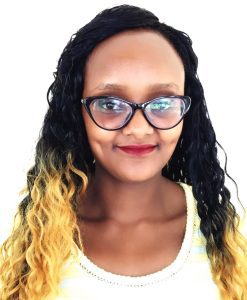 During her summer 2019 fellowship at the Polytechnique Montréal CERC, Janet built up an academic as well as a professional network in finance and artificial intelligence. Those contacts inspired her to apply for a master’s degree in computational finance at Université de Montréal. She was accepted, and in September 2020 started work on a new project with an adviser. She hopes to go on to teach data science in Kenya or South Africa and set up an NGO to support young women looking to study in STEM-related fields. Her advice to people interested in AI as a career: “You’ll be making the right choice for you, but for your community as well, because AI-driven technology tools can help solve all kinds of problems!”
During her summer 2019 fellowship at the Polytechnique Montréal CERC, Janet built up an academic as well as a professional network in finance and artificial intelligence. Those contacts inspired her to apply for a master’s degree in computational finance at Université de Montréal. She was accepted, and in September 2020 started work on a new project with an adviser. She hopes to go on to teach data science in Kenya or South Africa and set up an NGO to support young women looking to study in STEM-related fields. Her advice to people interested in AI as a career: “You’ll be making the right choice for you, but for your community as well, because AI-driven technology tools can help solve all kinds of problems!”
Junior Momo (Cameroon)
 Working alongside subject-matter experts during his fellowship with the GERAD not only allowed Junior to further his research project; it also gave him a chance to hone his collaborative and communications skills. The experience brought him international visibility and new contacts, which led him to pursue studies toward a doctorate at Concordia University. He’s also maintained close ties with the others in the cohort. Junior’s plan is to start up a project incubator in Africa to provide support and guidance to emerging entrepreneurs. “The AIMS-IVADO partnership changed my life,” he says. “I have a better sense of the value of data and how they can drive improved decision-making. We manipulate and exchange data every single day: we have to exploit them!”
Working alongside subject-matter experts during his fellowship with the GERAD not only allowed Junior to further his research project; it also gave him a chance to hone his collaborative and communications skills. The experience brought him international visibility and new contacts, which led him to pursue studies toward a doctorate at Concordia University. He’s also maintained close ties with the others in the cohort. Junior’s plan is to start up a project incubator in Africa to provide support and guidance to emerging entrepreneurs. “The AIMS-IVADO partnership changed my life,” he says. “I have a better sense of the value of data and how they can drive improved decision-making. We manipulate and exchange data every single day: we have to exploit them!”
Matar Ndongo (Senegal)
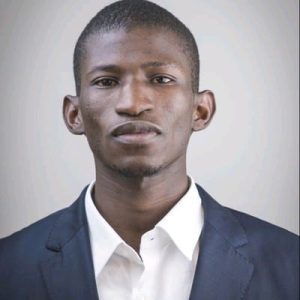 “Thanks to the contacts I made during my stay at Tech3lab HEC Montréal, I’ve had openings in Montréal, France and Senegal. I gained experience and new research knowledge that will be useful to me in my professional life. In Africa, I’ve noticed that many sectors, including health, climate, agriculture, education and others, are generating large volumes of data, but the specialists who can harness those data are lacking. So I’m looking to create a startup to support training in professions related to data and business intelligence. My advice to young people who haven’t had the opportunity to study math at the university level is to teach yourself via bootcamps and online certifications, and take part in network events.”
“Thanks to the contacts I made during my stay at Tech3lab HEC Montréal, I’ve had openings in Montréal, France and Senegal. I gained experience and new research knowledge that will be useful to me in my professional life. In Africa, I’ve noticed that many sectors, including health, climate, agriculture, education and others, are generating large volumes of data, but the specialists who can harness those data are lacking. So I’m looking to create a startup to support training in professions related to data and business intelligence. My advice to young people who haven’t had the opportunity to study math at the university level is to teach yourself via bootcamps and online certifications, and take part in network events.”
Nneka Maureen Okolo (Nigeria)
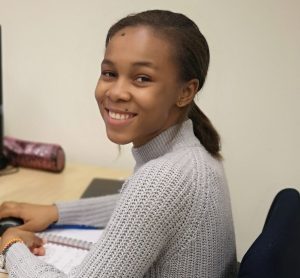
“I’m sold on the potential of reinforcement learning (RL) algorithms and I’m currently continuing my studies in that field in Spain. More than a year after completing my fellowship at Polytechnique Montréal, I’m still in touch with my advisers, the IVADO team, the other fellows from the AIMS-IVADO cohort, and friends I made while in Montréal! Five years or so from now, I see myself working in an R&D lab, acquiring the means to create effective solutions and publish high-quality research findings. I encourage you to study in RL! We need people prepared to engage in transparent, evidence-based, reproducible research to make meaningful progress in this field. Keep an open mind, show willingness and determination, and go for it! Write a cover letter, submit applications and spread the word about yourself in the RL research community. I also strongly recommend that you read Reinforcement Learning: An Introduction by Richard Sutton and Andrew Barto.”
Ola Badr (Sudan), Polytechnique Montréal
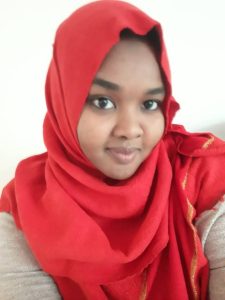 Ola is completing a double-degree program in computer vision and pattern recognition at Lappeenranta-Lahti University of Technology LUT in Finland. She is working to build an agnostic framework that helps in animal reidentification based on images from camera traps, providing a non-invasive way to track animals in the wild. “Three or four months might not sound much, but the impact my AIMS-IVADO internship left in both my academic and general handling of problems is tremendous. Working to solve real-life problems with competent scientists helped me strengthen my knowledge in machine learning and my problem-solving skills in general. It also helped me find a network of support which continues to give even after the completion of the program. I encourage beginners to not be intimidated by the achievements of other people in the field: equip yourself with the basics of calculus, linear algebra and good programming, and with lots of practice you will achieve great results! I have found my passion in computer vision and I am building up to start my PhD journey in this area.”
Ola is completing a double-degree program in computer vision and pattern recognition at Lappeenranta-Lahti University of Technology LUT in Finland. She is working to build an agnostic framework that helps in animal reidentification based on images from camera traps, providing a non-invasive way to track animals in the wild. “Three or four months might not sound much, but the impact my AIMS-IVADO internship left in both my academic and general handling of problems is tremendous. Working to solve real-life problems with competent scientists helped me strengthen my knowledge in machine learning and my problem-solving skills in general. It also helped me find a network of support which continues to give even after the completion of the program. I encourage beginners to not be intimidated by the achievements of other people in the field: equip yourself with the basics of calculus, linear algebra and good programming, and with lots of practice you will achieve great results! I have found my passion in computer vision and I am building up to start my PhD journey in this area.”
Gaelle Patricia Talotsing (Cameroon)
 “This partnership gave me the opportunity to travel outside my country for the first time, and my experience was so enriching! I gained a variety of skills in several fields of artificial intelligence from experts in the field. Working at the Polytechnique Montréal CERC really helped focus my research aspirations, and I’m comfortably moving on to a doctoral degree. In fact it was during my fellowship that I met Professor Samuel Pierre, who agreed to be my thesis adviser for my PhD in computer engineering at Polytechnique. I plan to give the best of myself in working toward this degree, and I also want to get involved in activities to inspire other people, especially girls and women, in the STEM fields. My message to someone thinking about getting into AI is: Welcome to the science of the present and the future. It’s going to open up major potential and opportunities for you!”
“This partnership gave me the opportunity to travel outside my country for the first time, and my experience was so enriching! I gained a variety of skills in several fields of artificial intelligence from experts in the field. Working at the Polytechnique Montréal CERC really helped focus my research aspirations, and I’m comfortably moving on to a doctoral degree. In fact it was during my fellowship that I met Professor Samuel Pierre, who agreed to be my thesis adviser for my PhD in computer engineering at Polytechnique. I plan to give the best of myself in working toward this degree, and I also want to get involved in activities to inspire other people, especially girls and women, in the STEM fields. My message to someone thinking about getting into AI is: Welcome to the science of the present and the future. It’s going to open up major potential and opportunities for you!”
Sara Ebrahim (Egypt)
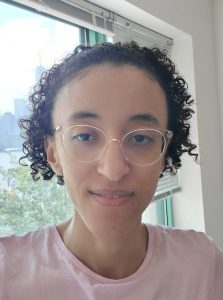 Networking and teamwork are two aspects that made a particular impression on Sara during her internship at Mila. She says they helped her get a better sense of what work “on the ground” is like. During her time in Montréal she also got involved in the AI4SocialGood initiative, learning that AI technologies can also serve projects with a non-profit component. Sara is currently working at Facebook on deep learning. Her experience made her realize that she wants to focus more on the engineering side of things, to be involved in more tangible projects. Her advice to aspiring AI specialists: “You can teach yourself programming in Python. That’s how I started, with a series of 10 courses. This is a field that’s accessible to anyone! Networking is super important: if you want to get ahead, you have to build your network.”
Networking and teamwork are two aspects that made a particular impression on Sara during her internship at Mila. She says they helped her get a better sense of what work “on the ground” is like. During her time in Montréal she also got involved in the AI4SocialGood initiative, learning that AI technologies can also serve projects with a non-profit component. Sara is currently working at Facebook on deep learning. Her experience made her realize that she wants to focus more on the engineering side of things, to be involved in more tangible projects. Her advice to aspiring AI specialists: “You can teach yourself programming in Python. That’s how I started, with a series of 10 courses. This is a field that’s accessible to anyone! Networking is super important: if you want to get ahead, you have to build your network.”
Yasser Salah Eddine Bouchareb (Algeria)
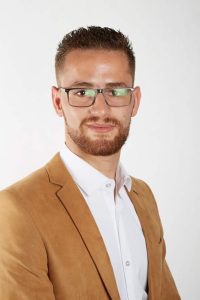 Yasser, who did his research fellowship at Mila as well, also points to his networking with the rest of the cohort and with students and supervisors as an important aspect of his experience. He’s now employed by Google, and the project he’s working on has much in common with his fellowship, involving research on computer vision, segmentation and imaging. Yasser hopes to either land a full-time gig with Google or resume studies toward a PhD. His tips for people thinking of a career in artificial intelligence are: “Read as many papers as you can. Collaborate, rather than working alone in your corner. You’ll have a better vision of your goals. Stay on top of the latest news in your research field. When you’re working on something, tell yourself there’s probably someone somewhere working on the same thing, and that it can be very beneficial to exchange ideas!”
Yasser, who did his research fellowship at Mila as well, also points to his networking with the rest of the cohort and with students and supervisors as an important aspect of his experience. He’s now employed by Google, and the project he’s working on has much in common with his fellowship, involving research on computer vision, segmentation and imaging. Yasser hopes to either land a full-time gig with Google or resume studies toward a PhD. His tips for people thinking of a career in artificial intelligence are: “Read as many papers as you can. Collaborate, rather than working alone in your corner. You’ll have a better vision of your goals. Stay on top of the latest news in your research field. When you’re working on something, tell yourself there’s probably someone somewhere working on the same thing, and that it can be very beneficial to exchange ideas!”
We’re eagerly awaiting a resolution to the health crisis so that we can continue our collaboration with AIMS, do our part to foster diversity in digital intelligence, and encourage new fellows to make their ambitions a reality.